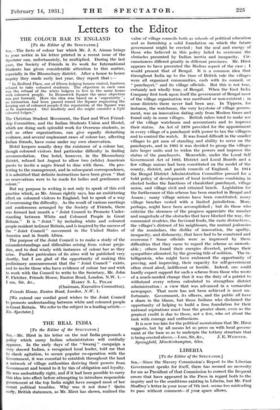THE REAL INDIA
[To the Editor of the SPECTATOR] SIR,—Mr. Hirst in his letter on the real India propounds a policy which many Indian administrators will cordially approve. In the early days of the Swaraj " campaign a very shrewd Indian, a recognized local leader, told me that to check agitation, to secure popular co-operation with the Government, it was essential to establish throughout the land a network of village authorities deriving their powers from Government and bound to it by ties of obligation and loyalty. Ile was undoubtedly right, and if it had been possible to carry this idea into effect before attempting to introduce responsible government at the top India might have escaped most of her recent political troubles. Why was it not done ? Quite early, British statesmen, as Mr. Hirst has shown, realized the
value of village councils both as schools of political education and as furnishing a solid foundation on which the future government might be erected ; but the zeal and energy of those who believed in this policy failed • to overcome the obstacles presented by Indian inertia and incapacity. Cir- cumstances differed greatly in different provinces. Mr. Hirst appears to have presented the Madras aspect of the case ; I would present that of Bengal. It is a common idea that throughout India up to the time of British rule the villages were all organized communities, each with its council, or " panchayet," and its village officials. But this is not true, certainly not wholly true, of Bengal. When the East India
Company first took upon itself the government of Bengal most of the village organization was moribund or non-existent ; in
some districts there never had been any. In Tippers, for instance, the watchman, the very keystone of village govern- ment, was an innovation dating only from Moslem times and found only in some villages. British rulers tried to make use of the village watchmen and accountants and to improve their status. An Act of 1870 provided for the appointment in every village of a panchayet with power to tax the villagers and to control the watch. It was found difficult in the smaller villages to get men of standing and ability to serve on the panchayets, and in 1905 it was decided to group the villages into larger units and to widen the powers and improve the status of the panchayets. Meanwhile, under the Local Self Government Act of 1883, District and Local Boards and a few village unions had been constituted on the model of the county, district, and parish councils of England. In 1914 the Bengal District Administration Committee pressed for a
bold policy of development of local institutions combining in elected bodies the functions of chaukidari panchayet, village
union, and village civil and criminal bench. Legislation for the furtherance of this scheme has been enacted in Bengal and Assam ; many village unions have been constituted, many village benches vested with a limited jurisdiction. More, perhaps, might have been accomplished ; but do those who criticize the slowness of the progress appreciate the number and magnitude of the obstacles that have blocked the way, the communal rivalries, the factional feuds, the caste distinction the villager's distrust of his neighbours, the mutual jealousies of the zemindars, the dislike of innovation, the apathy, incapacity, and dishonesty, that have had to be countered and overcome ? Some officials were so impressed by these difficulties that they came to regard the scheme as unwork- able ; others found their energies diverted, perhaps their sympathies alienated, by the growing tide of sedition. The in- telligentsia, who might have embraced the opportunity of proving, and improving, their capacity for self-government often stood aloof, indifferent or hostile. Indeed, one could hardly expect support for such a scheme from those who wrote of a much-needed change that it was the duty of a patriot to withstand every reform calculated to strengthen district administration : a view that was advanced in a vernacular newspaper. That more has not been achieved is most un- fortunate. Government, its officers, and the public all have a share in the blame, but those Indians who disdained the opportunity of helping to build a firm foundation for their national aspirations must bear the greater share, even as the greatest credit is due to those, not a few, who set about the task with courage and enthusiasm.
It is now too late for the political moratorium that Mr. Hirst suggests, but by all means let us press on with local govern- ment at the base so as to underpin the tottery structure that
is being erected above.—I am, Sir, &c., J. E. WEBSTER. Springfield, Minchinhampton, Glos.















































 Previous page
Previous page